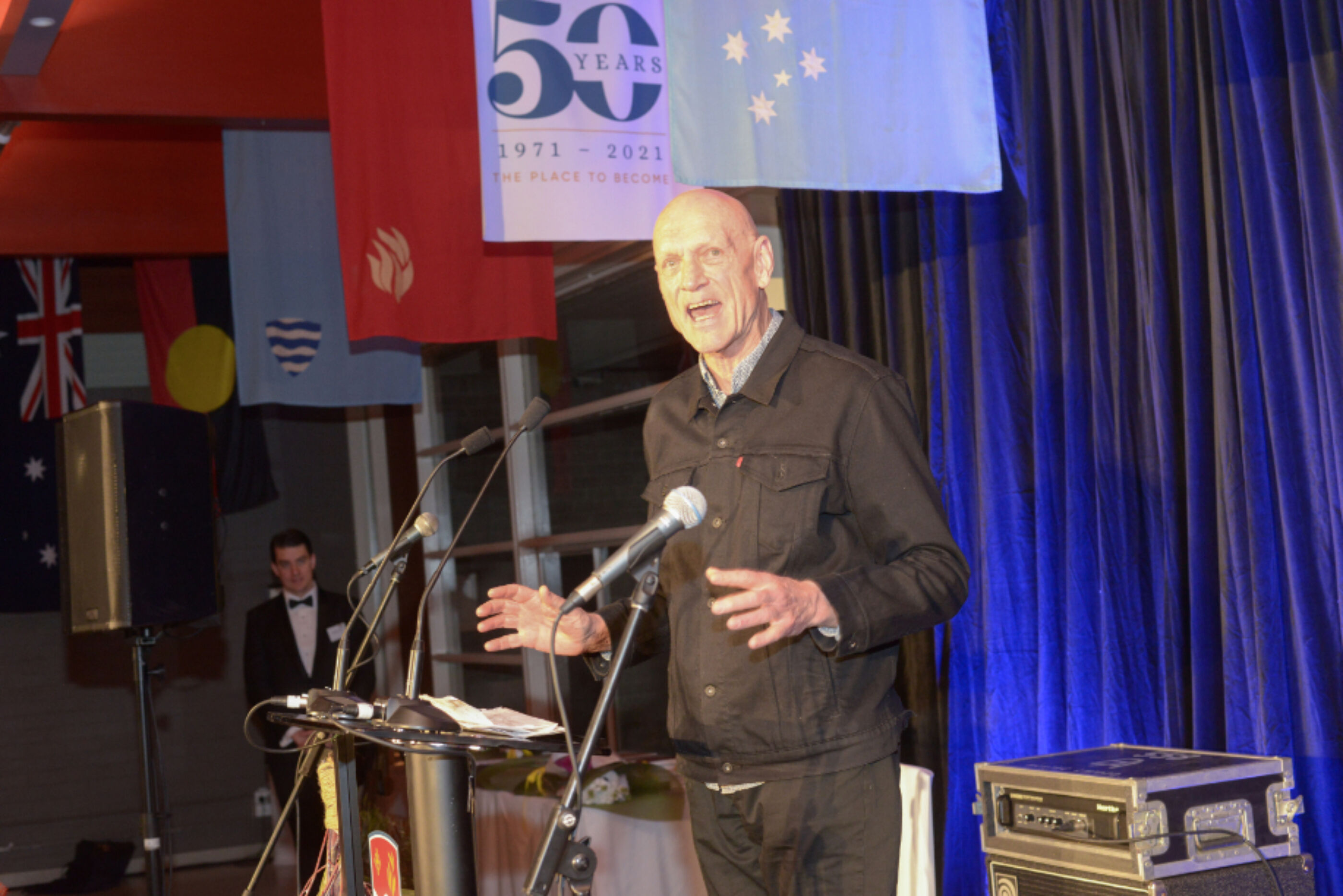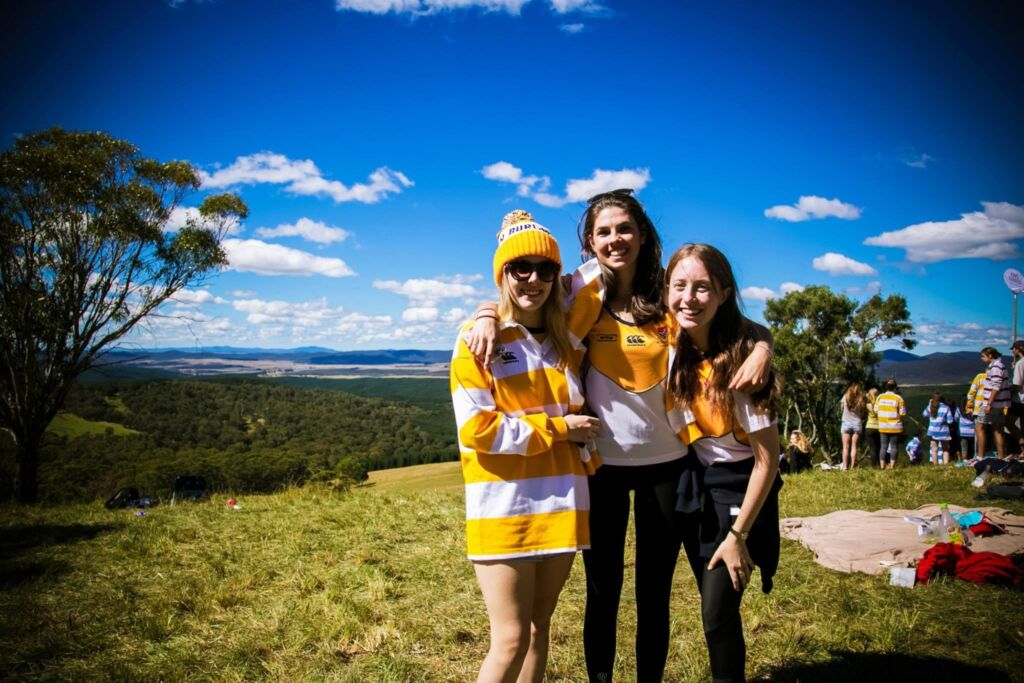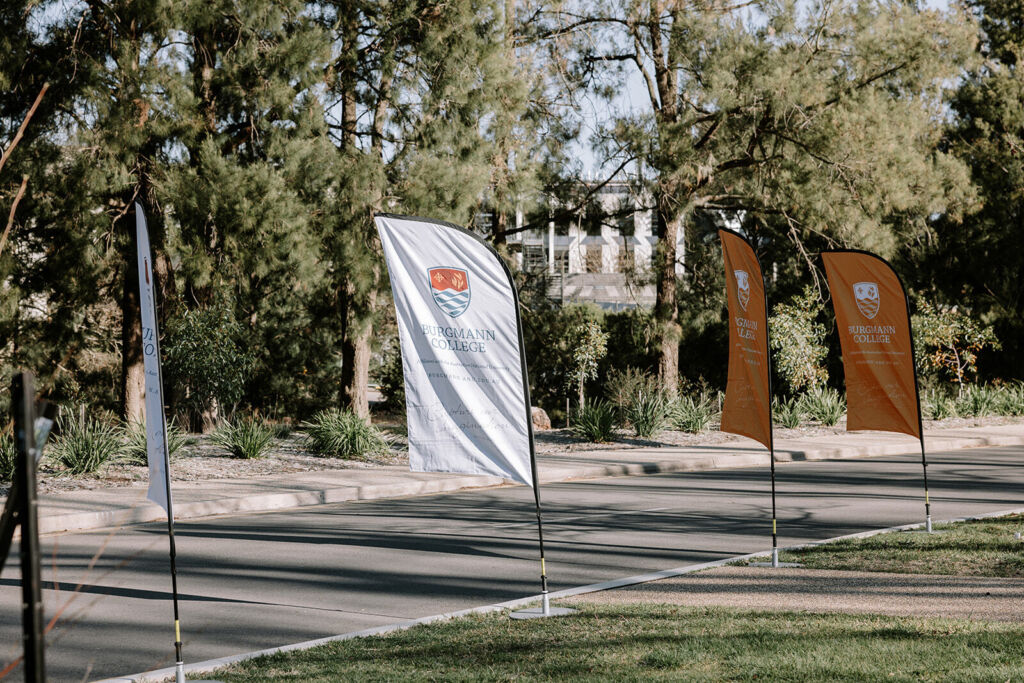There's a lot of eloquence in the room tonight, and Bas [Braham, 2022 BRA President (2020–2022)], that was really actually a fantastic distillation, from your perspective, of what Burgmann means to students who've been here more recently, and I'll go into what it means for students that have been here a long time ago.
But First Aunty [Aunty Dr Matilda House Williams, Friend of Burgmann College], it's wonderful to be in your company to make that acknowledgment and to see that finally you're receiving some due recognition and accommodation of the interests of Aboriginal and Torres Strait Islander people. And I do know that it's in no small part due to the leadership that's shown, both in this College from Principal Sally Renouf, and also across the university by Professor Schmidt [Prof Brian Schmidt, Vice Chancellor of ANU 2016–2024)—Brian, you’re here tonight, it's great to see you as well, and I want to acknowledge you, too. I won't go through all the other distinguished guests.
I'll explain to you what my role is actually, so you understand what's happening, because I haven't been doing a lot of public speaking lately: I've been doing a lot of entertaining. So I've decided to leave the public speaking and maintain the entertaining!
Richard Cook, who was the first President of the Burgmann Residents Association [BRA], in his Will, left the following sentence: 'If possible, I should like a function at Burgmann College to be attended by Mr Peter Garrett, who will propose a toast to the founders of the College, including Professor David Griffin, (who you've heard about tonight from Lew and others) and Mr John Terry.'
So that's actually why I'm standing here. Now, let me set the context for you, because Richard and his other friends who were part of the first student intake (and some of us are sitting at a table tonight, and I think I was the 9th or the 11th student in 1971 to be [at] Burgmann College) used to spend time entertaining themselves with their witty stories and their eloquence, and their japes, and they would drink a great deal, as people did at that time. And I, as the Burgmann college barman, dutifully served them.
So Richard is having the last laugh, as would be his wont, by getting me to propose the toast. I hope everybody realizes the humour behind all of that. And Juliet [Robinson, Richard Cook's partner], to you especially, not only condolences but it's great to see you here tonight. So I'll come back to the character of Richard briefly, but let's just say spontaneous, very smart, mischievous, and with a very good heart, but also unpredictable. And that's how my address should be as well.
Of all the good things that you can take out of an education at a great university like ANU, particularly on the foundation of having lived in a residential college, is the opportunity to make the joint work a bit better. It's really not about your own personal advancement, although that can be important at times, it's really more about ‘where is the place at’. And the place that it's at, is not so good. So let me identify who I think the culprits are, in particular historically. And I'm going to go to the two great giants of post-war conservative leadership: Margaret Thatcher of the United Kingdom and Ronald Reagan in the United States.
And both of these figures, who are considered towering by conservatives and by historians, are remarkable because they're remembered for two statements: a statement each that they made. Thatcher's statement was that there is no such thing as society. And Reagan's statement was that there is no such thing as good government. And it is out of those two statements that leadership in the then Western world, that the current crisis that we have in democracy, and the provision of opportunity, of safety, of well-being for many, many people lies.
And Richard Cook would have known that many people here may or may not agree with my assessment, but that is where we sit right now. And for this College to do anything at all other than give you a pretty funky place to live in, I must say, the tales about what it was like for the students who came here in the first instance are true and allow us the liberty of engaging in a couple of others.
My dear mate Mark Dodshon (1971–1974), who's sitting with me and I, were good friends here and we're still friends to this day—that's the great thing about this College: you keep these friendships. Reminded me that when we came here and it was still a building site, there was scaffolding up against the various wings. So we climbed the scaffolding to scope out our rooms. Having scoped out our rooms, we then sought out the master, David Griffin, and said, 'Well, we've worked out which rooms we want to be in.' Instead of issuing us with an occupational health and safety warning, he assigned us those very rooms.
That's the kind of place Burgmann College was. So I'm number 9 or number 11, and the spirit that pertained in the College at the time is a spirit that I can discern and see, not only what we've heard from Bas, but in all of the remarks that have been made here tonight.
Let us praise some of those things in the spirit and identify the ones that are important as we toast the College.
Emotional intelligence: identified in some of the documents, the master planning and the strategy and the values of the College. It's not about education, really. I mean, everyone in this room is smart. You're all halfway up the bell curve or towards the top. You're going to do well in life. The vicissitudes and the fates notwithstanding, I have every confidence in that.
And it's not really about the smarts, as Brian and others will know; they're important to enable us to harness our efforts to do good things. But it's the emotional intelligence, it's the commitment, it's the engagement, it's the willingness to work with others, it's the setting aside of ego, it's actually figuring out what we can do together and being sensitive to others as we do it, understanding our history and understanding our possibilities that leads us there. So I think the emotional intelligence component, Sally, that you've been focusing on, is incredibly important here, and as an elder, as it were, I want to strongly endorse that.
And I want to say something about elders as well. We can learn a lot from First Nations culture, and one of the things that we can learn is the respect that pertains to elders. It's a respect that we don't show in the modern consumeristic culture. We think that somehow when someone gets past a certain point in time, they almost become invisible; they almost don’t exist. Now, that doesn't apply to me, I know that, but that is what happens to people. And yet they have so much to give and so much to offer. And one of the reasons I wanted to come, not only to fulfil Richard’s wishes in his Will, but also to encourage the alumni, is that that's what an alumni is about. It's about harnessing those wisdoms and turning them into a great resource, which in turn comes back and supports the College. That's what it's all about.
So this foundation's here. So, yes, it's emotional intelligence. Yes. It's deciding that you're actually going to set other things aside other than your own interest. And through the conduit of your residency of this College, we all have the opportunity to do that, particularly the alumni.
Foundations have got to be strong. As a muso I can tell you that. I mean, sometimes you'll get a song and the architecture might not quite be there, the motivation, there is something about it that’s just not quite right. You can rehearse it, you can rework it, you can sit down at the mat, you can go into a studio, you can sprinkle a fairy dust on it, you know, you can film yourself doing it on TikTok—you still can't make it sound any good. You know, it's just no good. It hasn't got that foundation. It's on the foundation of song, of building a relationship. Institutions, countries, that's what it's about. And the foundations here are strong. The foundations and the ethos that lead you all here is strong.
So having said all of that, let me now come briefly to Richard Cook, and in doing that, make one final remark about what I think is very, very important for the College, and one which I know that the founding members, including Richard, would endorse.
A College like this, notwithstanding its good values and it's decent and proper motivation, is still basically a place of privilege. And I know that I was here and I was privileged to come here. I come from a middle-class background as well, but it can't be a fortress or a citadel where the values are expressed, but they're not lived out, where the values are seen as something that are ancillary to what you're doing, as it were. The values have got to go to the heart of what you're doing, and that's where the change-making takes place. That's where the betterment takes place. And incidentally, that's where the good stuff happens to you as well, because you're fulfilling your own best capacities, your best skills, your best aspirations by doing that.
There's nothing particularly virtuous for me if someone rocks up and says, you know, 'I'm a lawyer by training—I'm a lawyer and I'm in the thing and I earn this much money and we do the….' Okay, alright mate, you know, whatever, you know, seriously. Okay. You worked hard, you're smart. You've got the money. That's not the point. I've got a pro-bono thing that we're doing and we make sure we support, you know, ten Aboriginal people every year. It's not enough. It's not nearly enough and neither is it enough to have a reconciliation action plan. You can actually do stuff with it.
So I want to really leave that with you: this idea that you take things out of here, which a lot of people don't have. The joy and the fun and traditions and the ritual and the mateships and the relationships and the romances and whatever else comes out of it. Fantastic stuff. That's the bread and butter of life. But then when you back out there in Ronald Reagan and Margaret Thatcher's heritage, if you believe strongly in the values of the College, then you want to do something about that and you have the opportunity to do that. And when alumni do that, I think that can make a very big difference. In looking through, incidentally, the list of alumni achievements and the people who have been here, I can see that many of them do do that indeed.
So, to come [to] Richard: he was mischievous, he was a little bit older than we were, we had to make our own fun and we did, he was one of the ringleaders (not the only one, here were many, many talented people here), he was a generous person, a funny person, slightly dishevelled, but smart. And he thought through, he saw something (that well, I certainly didn't because I was too busy pouring beers) but he saw something which I realised when I was preparing these remarks, because it's not a speech, that he thought to himself, and I'm now surmising totally: 'Wow, we have a blank slate. We don't have the hierarchy that we heard about earlier, this ridiculous absence to these stupid things from England and Scotland or whatever it might be. We don't have this waffling and carry on and sort of bowing and scraping and red carpets and pomposity, or at least not too much of it. But what are we going to replace it with if we're not going to have that? We have to have something else.'
We weren't mindful enough (Matilda it has to be said at that point in time, I must confess) to recognise that we really should have been thinking, even then, about 'Hang on a minute, people probably camped on the side of Sullivan's Creek. They probably spent time getting food out of that creek.' We weren't mature enough, we weren't thoughtful enough, we weren't aware enough in our history as young kids to do that at that time. But Richard saw something, and so some of those traditions began, some of that sense of creating fun, of sort of making fun of royalty that began.
But then you have to say, as I've just been saying to you, 'Well, then what did you actually do?' In this case, what did he actually do? So he's a lawyer and so he starts a residential college in Melbourne. He creates something himself to replicate the experiences that he saw take place in this place, when he was here in the first year of intake. And that's [a] residential college. It's not like a big Burgmann, and it's a series of houses around Melbourne provides an opportunity for kids, in his words, who could get overwhelmed by going to uni for the first time, of being in a big city for the first time: they actually have a place where they could be with other students and leave and then go on to do their studies well.
So that's what Richard Cook left us. He left us the first part of the Burgmann tradition, St Beryl, and those things with all the colleagues and friends, some of whom are here. And then he left that legacy subsequently in his later life. So he's telling us all something very profound and very important, which is why it's a great pleasure for me to be able to propose this toast. Someone will bring me a glass of wine, I'm hoping reasonably rapidly, so I can do it formally, because I think a proper proposal of toast requires me to have a glass in my hand. And yet again. Thank you very much, sir.
I would like to propose a toast to the founders of Burgmann College, including Professor David Griffin and Mr John Terry, and the institution of which they were a part and which will continue to do what we know it can do for the years to come.
Cheers, everybody.


